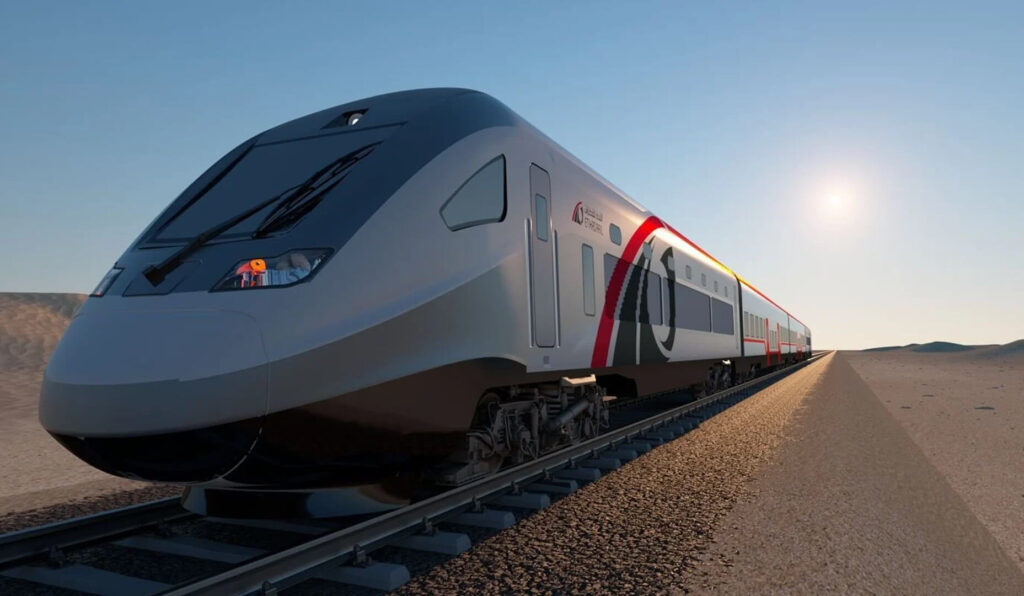Etihad Rail is set to transform public transport in the UAE with its modern, high-speed rail network. Connecting all seven emirates, the rail system will enable fast, clean, and convenient travel — with journeys like Abu Dhabi to Dubai taking just 30 minutes on a dedicated high-speed route. Passenger services are expected to begin next year, marking a major milestone in the country’s transport evolution.
A Vision Years in the Making
Launched in 2009, Etihad Rail began by transporting granulated sulphur between Shah and Ruwais. In 2020, it expanded to link the UAE from Ghuweifat on the Abu Dhabi-Saudi border to Fujairah on the east coast. The 1,200 km network is now fully constructed, ready to serve both freight and passenger movement.

What the Rail Network Offers
- Speed: Passenger trains will travel up to 200 km/h, with high-speed trains reaching 350 km/h
- Capacity: Each train can carry up to 400 passengers
- Amenities: Wi-Fi, power outlets, entertainment systems, and food options
- Comfort: Spacious seating and business-class lounges at major stations
Key Routes and Travel Times
- Abu Dhabi to Dubai: 57 minutes (30 minutes on high-speed line)
- Abu Dhabi to Al Ruwais: 70 minutes
- Abu Dhabi to Fujairah: 105 minutes
Passenger Stations Across the Country
Major stations are located in Abu Dhabi, Dubai, Sharjah, and Fujairah, with additional stops at:
- Reem Island, Saadiyat Island, Yas Island (Abu Dhabi)
- Al Maktoum International Airport and Al Jaddaf (Dubai)
- University City (Sharjah)
- Sakamkam (Fujairah)
Station designs draw inspiration from Emirati heritage and include retail outlets and family-friendly amenities.
Environmental and Economic Impact
Etihad Rail aims to reduce traffic congestion and cut carbon emissions by shifting freight and passenger transport off highways. It supports national sustainability goals and will:
- Improve logistics across ports and industrial hubs
- Link key cities and economic zones
- Boost regional trade and travel
Seamless Last-Mile Connectivity
To make travel smoother, Etihad Rail stations will be integrated with metro, bus, and shared mobility services like bikes and e-scooters. Pedestrian-friendly infrastructure will enhance the overall commuter experience.
Ticketing and Payment
Travelers will be able to use their nol cards, thanks to a partnership with Dubai’s Roads and Transport Authority (RTA). Ticketing systems will be fully integrated for ease of travel across multiple transport modes.
Freight Connectivity and Trade Hubs
Etihad Rail connects major ports and industrial zones including:
- Khalifa Port (Abu Dhabi)
- Jebel Ali Port (Dubai)
- Port of Fujairah
- Industrial City of Abu Dhabi, Al Ruwais, and Ghuweifat
The rail system will carry over 60 million tonnes of goods and 36.5 million passengers annually by 2030.
UAE-Oman Rail Link: Hafeet Rail
In partnership with Oman, the Hafeet Rail project will connect Sohar Port to the UAE’s rail network via a 303 km line. Travel from Sohar to Abu Dhabi will take just 1 hour 40 minutes, and Sohar to Al Ain only 47 minutes. This $3 billion project will strengthen Gulf trade and mobility.
A New Era in UAE Travel
Etihad Rail represents a leap forward for transport in the UAE and the region. By connecting 11 key cities and reducing travel time drastically, it promises to reshape mobility for people and goods — with sustainability, efficiency, and convenience at its core.
